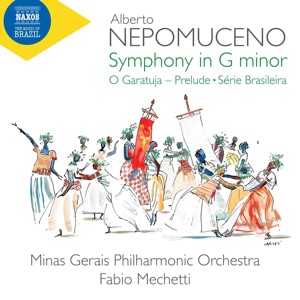Alberto Nepomuceno (1864-1920) was a major force in the development of Brazilian music at the turn of the twentieth century. He worked as a composer, conductor, and educator, tirelessly promoting Brazilian music and the use of Portuguese as an “art language.” The three orchestral works presented here are typical of his work. The Prelude to O Garatuja (1904), an incomplete lyric comedy, uses obvious national themes and offers nine minutes of high-spirited fun as well as a lightness and elegance found in all of the pieces on this disc.
The Brazilian Suite of 1891 had me immediately thinking “Grieg,” and it came as no surprise to learn that Nepomuceno befriended the Norwegian composer during his studies in Europe and saw him as a model. All the same, the work is beautifully scored and in several places quite personal in expression–its four movements representing “Dawn at the Mountains,” a gentle Brazilian dance intermezzo, “Napping in a Hammock,” and a gutsy concluding “Batuque” with a notable part for some native percussion (a reco-reco, or guiro).
Nepomuceno’s Symphony in G minor dates from 1893, the same year as Dvorák’s “New World.” It’s a much more conservative piece than that, although the opening movement has a nice rhythmic swing to it, and both the slow movement and scherzo feature characterful melodic ideas. The scherzo, in particular, mixes a sort of Mendelssohnian delicacy with sudden military interjections from the trumpets and timpani that are very effective. The finale, though, as with so many late romantic symphonies, disappoints. It’s based on the rhythm of the first allegro in Schumann’s “Spring” Symphony, repeated endlessly. Despite a charming second subject, the movement never really gets off the ground, and the ending, with piccolo, cymbals and triangle making a predictable entrance, is unmotivated and ineffective. A good effort, in other words, but a true symphonist Nepomuceno evidently was not, and that’s no crime.
The Minas Gerais Philharmonic, a relatively new group founded only in 2008, plays all of this music very well under Fabio Mechetti. The ensemble has good discipline, and reveals some fine players occupying the principal woodwind and brass chairs. They are also quite well recorded in what sounds like a flattering acoustic space, the Sala Minas Gerais in Belo Horizonte. I look forward to further releases from these forces. Minas Gerais is a region perhaps best known as a source of gems and minerals for collectors, and I’m happy to report that the region’s jewels include more than just the rocky kind. Nepomuceno’s output may have been uneven, but his music is worth getting to know, and a disc like this offers an ideal introduction.
































